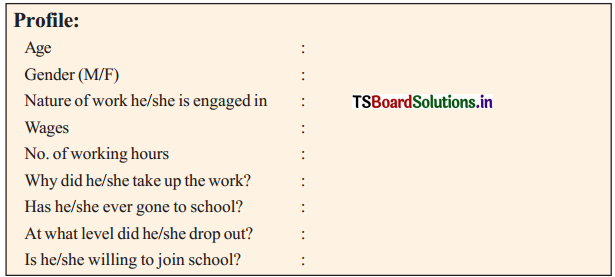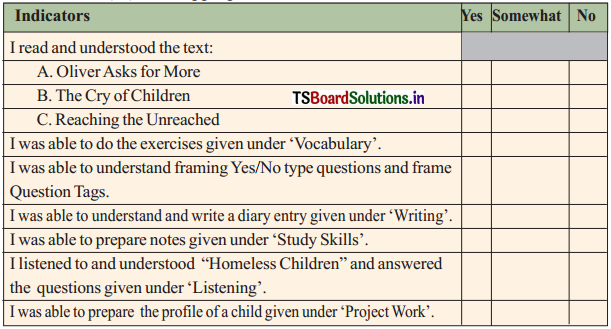TS 8th Class English Guide Unit 2C Reaching the Unreached
Questions and Answers
Answer the following questions.
Question 1.
Complete the following table based on the above article?

Answer:
| Name of the child |
Age |
Nature of work for which engaged |
| 1. Romesh |
14 |
Rag picking |
| 2. Shanti |
Household |
Chores |
Question 2.
Who rescued the two children? Where did they take them to?
Answer:
Romesh was rescued by The Child Line. He was taken to Andhra Pradesh State based project for the Elimination of Child Labour. Shanti was rescued by the Child Labour Enforcement Team. She was taken to a Girls Transit Home
Question 3.
Many households in your neighbourhood employ children to do the menial jobs. What will you do to save those children?
Answer:
I will inform The Child Line or The Child Labour Enforcement Team or Child Rights and You Organisation or SOS Organisation about the children who are employed in households as child labour with the help of my friends. I also complain about it in the police station
Question 4.
What is the role of CRY?
Answer:
Child Rights and You (CRY) is an organisation which believes that children are citizens and they have their rights. This organisation gathers support and money from Indians around the world and help the struggled children. It freed many children from hunger, prevented child marriages and joined many children in schools
Question 5.
Three organisations are working to save the destitute. What are they?
Answer:
Child Rights and You (CRY), Save our Soul (SOS) and Childline are the three organisations working to save the destitute
Question 6.
How does SOS work?
Answer:
SOS is an organisation that provides family-based care for children in India. It believes that every child should grow up in a strong family environment. It is the only organisation of global impact that provides direct care to children who can no longer stay with their families. It aims to improve the overall framework conditions for children whose parents cannot take care of them
Study Skills
Read the following passage extracted from the story Oliver Asks for More and the notes made on it
The members of this board were very wise and philosophical. As they turned their attention to the workhouse, they discovered that it was a regular place of public entertainment for the poorer classes. It was the place where they had breakfast, dinner, tea, and supper all the year round and free; where it was all play and no work
This was really a shocking state of affairs, they were of the opinion that the poor should be given only two alternatives, to starve either quickly outside the workhouse, or gradually inside the house, view, they decided that the inmates of the workhouse would be issued three meals of thin gruel a day, with an onion twice a week
For the first six months after Oliver Twist was moved in, the system was in full operation. As a result, during this period, the number of workhouse inmates got smaller, and the inmates themselves shrank in size and became thinner
Observe the notes made from the above passage.
Title : Orphanage
- The board
- very wise and philosophical men
- their attention to the workhouse
- was a regular place of public entertainment
- had breakfast, dinner, tea and supper
- all play and no work
- The decision
- to starve quickly outside the workhouse
- gradually inside the house
- issued three meals of thin gruel
- an onion twice a week
- Result of the decision
- the inmates of the work house got smaller
- shrank in size
- became thinner
Now, read the passage Child Rights and You (CRY) once again and make notes with another suitable title
Child Rights and You (CRY) is an organization that believes that children are citizens and they have their own rights. At CRY, they do not believe in charity. Nor do they run schools or orphanages. Instead, they partner some basic level organizations working for children, their parents and communities. CRYs role is that of a bridge between child developmental organizations and people working for marginalized children. They gather the support, money and time of the Indians around the world and thousands of field workers across India who struggle to enrich the lives of children. CRY has freed more than 1 lakh children from hunger, exploitation and illiteracy in more than 13000 villages and slums. The organization has successfully prevented child labour in 648 villages across the nation and liberated 1152 villages from child marriages. It also has 21,676 out of school children in its account who have now joined schools. These children are into their childhood with all due opportunities of life?
Answer:
- CRY believes
- Children are citizens
- Children have rights
- CRY functions
- It partners organizations working for children
- bridges between organizations and people
- gathers support and money
- CRY achievements
- freed 1 lakh children from hunger
- prevented child labour in 648 villages
- liberated 1152 villages from child marriages
- joined 21,676 children in schools
Listening
Listen to the song your teacher sings.
Homeless Child
No mother no father
neither shoes nor a bed.
He lives in a street
on pavements of a road.
He is just ten
looks pale and thin.
He has so small a dinner
sometimes, he dines on the smell.
And even if he is starving to death
nobody comes to feed him.
As the sun rises and rays shoot him,
he is exposed to child labour.
Tears start rolling down his cheeks
there is nobody to comfort him.
And even if he is dead
There is nobody to worry about him
Answer the following questions.
Question 1.
What is the song about ?
Answer:
The song is about homeless children and their miserable life
Question 2.
Where does the child live ?
Answer:
He lives in a street on pavements of a road
Question 3.
How old is the child in the poem?
Answer:
He is ten years old
Project Work
In your village/city you may come across children who are working in some households, factories, shops, hotels and construction sites for daily wages. Collect the following information about one child. Make a brief profile of the child you have met and present it in the class.

Work in groups and analyze the data by using the following questions and present it before your class.
- Why do children take up jobs
- How poorly are they paid
- How many are willing to leave the work and join school
Answer:
Step - 1 (Collection of Data):
Profile:
Age : 13
Gender (M/F) : Male
Nature of work he/she is engaged in : Construction Work
Wages : 100/- per day
No. of working hours : 10 hours
Why did he/she take up the work? : Poverty
Has he/she ever gone to school? : yes
At what level did he/she drop out? : After completion of class - IV
Is he/she willing to join school? : Yes
Step - 2 (Presentation of Data after Consolidation)
This is a brief summary of our data on Child Labour. We met a boy of 13 years old. He came to Hyderabad city from a village. Now he is a labourer in construction work. His poverty forced him to join the construction work. He completed his 4th class in school. His parents are very poor. So they took the boy out of school and he joined a group of construction workers. He works 10 hours per day and receives an amount of 100/- only. He wants to join a school if anybody helps him
Self Assessment
How well have I understood this unit?
Read and tick (?) in the appropriate box.

Reaching the Unreached Summary in English
Romesh, a fourteen year old boy from Bihar, left his family and came to Hyderabad. As it became difficult to get a job, he joined a group of rag pickers. Luckily he got a helping hand from The Child Line and got benefit under a project for the Elimination of Child Labour
Shanti, a nine year old girl, was taken out of school by her parents and sent to Hyderabad to work in a middle-class home. She suffered all day long with heavy work. The owners locked her up in a tiny room when they went out. The neighbours informed the Child Labour Enforcement Team and the girl was rescued
There are so many children like Romesh and Shanti in our society. There are some organisations to work for such children
Child Rights and You (CRY) is one such organisation. It believes that children are citizens and they have their rights. This organisation gathers support and money from Indians around the world and help the struggled children. It freed many children from hunger, prevented child marriages and joined many children in schools
SOS is another organisation that provides family-based care for children in India. It believes that every child should grow up in a strong family environment. It is the only organisation of global impact that provides direct care to children who can no longer stay with their families. It aims to improve the overall framework conditions for children whose parents cannot take care of them
Glossary
widowed mother : the mother who lost her husband
paved (v) : covered with
rag picker : a person who collects waste material in streets
toiled (v) : worked hard
helping hand : assistance
rescuer (n) : a person who saved somebody from some difficult situation
beneficiary (n) : a person who gains as a result of something
elimination (n) : the act of removing something
abject (adj) : terrible and without hope
moping (v) : removing waste liquid with a waste cloth
awareness (n) : knowing something
campaign (n) : a series of planned activities for achieving a social aim
marginalised (adj) : unimportant
exploitation (n) : unfair treatment
prevented (v) : stopped
liberated (v) : set free
advocate (v) : support something publicly
advocacy (n) : public support